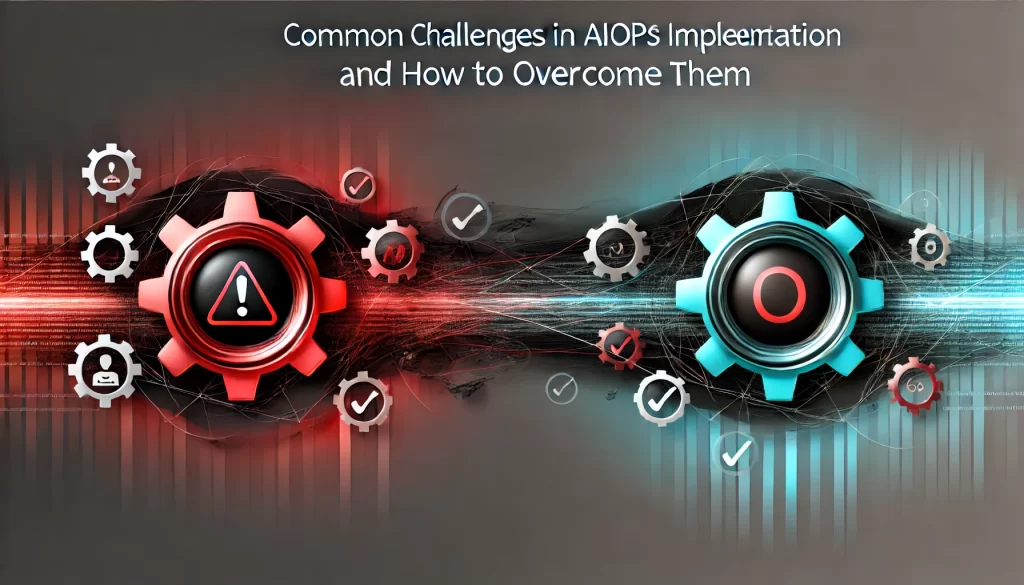
AIops (Artificial Intelligence for IT Operations) is reshaping how organizations manage complex IT environments. By integrating artificial intelligence, machine learning, and data analytics, AIops empowers IT teams to automate operations, predict issues, and optimize performance. However, deploying AIops successfully isn’t without its challenges. Many organizations struggle with fragmented data, resistance to change, and a lack of skilled expertise, which can hinder its effectiveness. This blog explores the common obstacles in AIops implementation, provides actionable strategies to overcome them, and highlights how theaiops.com can support organizations and individuals with training, certification, consulting, and freelancing resources.
The Growing Importance of AIops
AIops addresses the growing complexity of IT infrastructures caused by hybrid cloud environments, real-time applications, and rising data volumes. Gartner predicts that by 2026, 50% of large enterprises will integrate AIops to streamline IT processes, reduce downtime, and improve customer experience. Organizations adopting AIops have reported significant improvements in system reliability, operational efficiency, and resource utilization. Despite these benefits, several challenges persist in its deployment.
Common Challenges in AIops Implementation
1. Fragmented Data Silos
AIops thrives on large volumes of quality data to deliver actionable insights. However, IT systems often operate in silos, with different teams using isolated tools for monitoring, logging, and incident management. This fragmentation results in inconsistent and incomplete data, undermining AIops’ effectiveness.
How to Overcome:
- Centralized Data Integration: Use AIops platforms that aggregate and normalize data from multiple sources. Tools like Elastic, Datadog, and Splunk are excellent for integrating data streams.
- Invest in Data Quality: Cleanse and preprocess data to ensure it is accurate and actionable.
- AIops Training: Equip your team with the skills to implement data management best practices. Theaiops.com offers targeted training and certifications on data-centric AIops tools.
2. Resistance to Organizational Change
AIops implementation often disrupts traditional workflows, leading to resistance from IT teams who are unfamiliar with automation or fear job displacement. This cultural resistance can slow down deployment and reduce the system’s effectiveness.
How to Overcome:
- Communicate Benefits: Highlight how AIops can reduce workload and enhance team efficiency by automating repetitive tasks.
- Hands-On Training: Provide training to ensure employees are comfortable using AIops platforms. Theaiops.com offers comprehensive courses and certifications for tools like Prometheus, Kubernetes, and Grafana.
- Involve Teams Early: Engage employees during the planning phase to build trust and address concerns proactively.
3. Complexity of IT Ecosystems
Modern IT environments often involve hybrid clouds, microservices architectures, and distributed applications, making AIops integration a daunting task. Misaligned tools or processes can lead to implementation delays and reduced efficiency.
How to Overcome:
- Start with a Pilot Program: Test AIops on a specific use case, such as anomaly detection or log management, before expanding across the organization.
- Choose Scalable Platforms: Opt for tools designed to handle complex ecosystems, such as Dynatrace and New Relic.
- Consulting Services: Use AIops consulting from theaiops.com to develop tailored strategies for seamless integration.
4. Lack of Skilled Professionals
AIops requires a blend of expertise in AI, IT operations, and data analytics. Many organizations face a skills gap, making it difficult to configure and optimize AIops systems effectively.
How to Overcome:
- Upskill Teams: Invest in training and certification programs for your workforce. Theaiops.com offers hands-on training on industry-leading AIops platforms and frameworks.
- Hire Freelancers: Leverage freelancing support from theaiops.com to bring in experienced professionals during critical phases of deployment.
- Collaborate with Experts: Engage AIops consultants for strategic guidance and hands-on support.
5. High Initial Costs
The cost of AIops tools, infrastructure, and training can be a deterrent for organizations with limited budgets. Additionally, ROI from AIops may not be immediately apparent, making it difficult to justify the investment.
How to Overcome:
- Leverage Open-Source Tools: Start with cost-effective, open-source options like Prometheus and Grafana for initial implementations.
- Focus on High-Impact Use Cases: Prioritize areas where AIops can deliver quick, measurable benefits, such as reducing downtime or automating incident responses.
- Flexible Consulting Plans: Partner with organizations like theaiops.com that offer scalable consulting and support packages to optimize your budget.
How AIops Training and Consulting Can Help
Organizations looking to implement AIops can benefit from specialized training and consulting services. Theaiops.com offers a full suite of resources to help companies and individuals succeed in their AIops journey:
- AIops Training Programs: Learn industry-leading platforms like Datadog, Splunk, Dynatrace, and more.
- Certifications: Validate your expertise with globally recognized certifications in AIops tools and methodologies.
- Consulting Services: Get personalized guidance from experienced professionals to design, implement, and optimize AIops solutions.
- Freelancing Support: Access a network of skilled AIops freelancers to support your projects.
- Support Services: Ensure ongoing success with dedicated support for your AIops platforms.
How DevOpsSupport.in is helping in DevOps, SRE, and DevSecOps Services.
DevOpsSupport.in helps organizations enhance their IT operations by providing specialized services in DevOps, Site Reliability Engineering (SRE), and DevSecOps. They streamline development and deployment through CI/CD automation, improve system reliability with monitoring and incident management, and integrate security into the software lifecycle with automated testing and compliance practices. This enables faster, more secure software delivery, improved system uptime, and reduced operational risks, ultimately driving greater efficiency and business agility.
